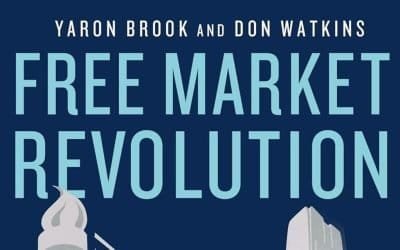RBC and any other company should be free to outsource as much as they want—because it is moral.
Jaana Woiceshyn
Corporate Welfare is Immoral
In its recently released budget the Canadian (Conservative!) government announced $6.4 billion of new corporate welfare spending. The aerospace sector will receive $1.2 billion of it over the next five years, Federal Economic Development Agency for Southern Ontario...
Is Egoism Obvious?
My book, How to Be Profitable and Moral: A Rational Egoist Approach to Business, has been translated into Finnish and was recently published in Finland. At the book launch in Helsinki, an appreciative reader (of the English-language original) and a business owner...
Selling Horse Meat as Beef: Buyer Beware, Too?
In my last article I wrote about stores selling products past their best before date—such as the expired canned lobster pate, which raised demands for legislation against selling expired food products in Canada. I argued that such legislation would be a violation of...
Review of Free Market Revolution
How Ayn Rand’s Ideas Can End Big Government by Yaron Brook and Don Watkins
Consumer Protection: Regulation vs. Reputation
A Canadian woman recently bought a can of lobster pate at a Wal-Mart store. The pate was about a year and half past its best before date, and the woman claimed that she felt ill about four hours after consuming some of the pate. In this era of the nanny state, the...
Thank The 1%
Instead of taxing the 1% more, we should thank them.
Eating Quinoa: Capitalist Exploitation?
The newly rediscovered, nutritious “miracle grain” quinoa, eaten increasingly by health-conscious consumers in the developed countries, is making the rich richer and the poor poorer. At least if we are to believe the recent article in The Guardian newspaper of the...
It’s Good—But Hard—to Be Selfish
Most people think that it is unethical to be selfish. They have been taught that we should always put others’ interests ahead of our own and that pursuing self-interest is immoral. That is why they also think that business—which by definition pursues self-interest:...
Income Inequality is Moral
I was listening to the radio on the weekend and heard a leading Canadian socialist, Stephen Lewis, lament about the big income gap between the rich and the poor as one of the worst ills in society today. Reflecting on that and on the exodus of millionaires from France...
Giving is Not a Duty
At this time of the year, many of us are giving presents out of benevolence, goodwill, appreciation, and love—I hope. Gifts are a means of showing that we value their recipients in some way, whether friends, loved ones, causes, or charities. Giving gifts out of duty...
Free Market Should Win Over Government Control
After months of deliberation, the Canadian government has finally approved the $15 billion takeover of the Canadian-based oil and gas producer Nexen Inc. by CNOOC, one of the state-owned oil companies of China. While I applaud the government for the approval, it...
On the Conflict Between Individual and Common Interests
Protection of individual rights, including property rights, is the requirement of harmony of people’s interests and everyone’s well-being, with the added benefit of goodwill and benevolence among all.
Why Humility is Not a Virtue
According to conventional morality, humility is a virtue. We are taught to think not too highly of ourselves or not to take credit for our achievements. Whatever we accomplish is due to collective effort or the grace of a higher power. A group of Executive MBA...
Envy is Bad For Us
I am writing this post in Finland where I am working for a month. Last week the Finns marked their annual unofficial “National Envy Day” when the Finnish Revenue Service publicized the income taxes and income of every tax-paying citizen. That in itself is a shocking...
Teamwork and the Virtue of Independence
If we are to believe people like President Obama who famously said: “You didn’t build that”, individual accomplishment is insignificant; only as a group we can build something. While collaboration, trade, and learning are great benefits of living in a society and we...
Altruism is Not a Guide for Living—or for Business
Most of us pursue self-interest every day: we eat nutritious food, engage in productive work (to have a purpose and to make a living), look after our health, enjoy recreation and entertainment, spend time with friends and loved ones, and go to the mall to buy things...
Why Governments Should not Interfere in the Sale of Publicly Traded Companies
This is an issue mostly in countries with abundant natural resources and governments bent on economic nationalism, but it nevertheless poses an interesting ethical dilemma. Canada’s economy is dominated by resource companies: in oil and gas, minerals, the forest...
What Drives Innovation, the Engine of Economic Growth?
Many economists today are arguing that the unprecedented era of innovation—the last 250 years or so since the industrial revolution—is going to be over soon, ending economic growth. Why should we care about economic growth? Because our well-being depends on it—the...
Ethics of Energy Companies
Energy companies, particularly those producing fossil fuels—oil, natural gas, coal—are under attack by the environmentalists and their sympathizers in the media. It is one thing to criticize companies such as BP, deservedly, for lax safety procedures or lacking...
Art, Business, and First-Handed Productiveness
I recently heard a panel discussion by some accomplished professional artists about a variety of topics, ranging from the motivation to paint to the creative process to commercial success. It made me think of parallels between art and business and the role of...
Subscribe for free.
Latest pro-Capitalism goodness sent weekly to your email box.
No spam. Unsubscribe anytime.





